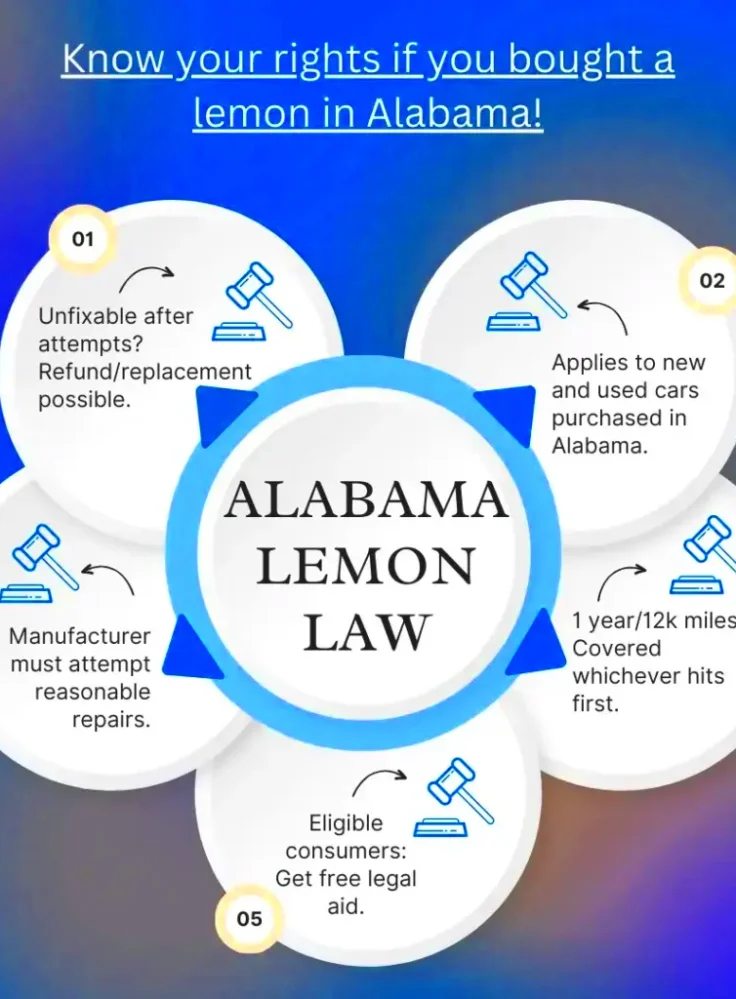An Overview of Lemon Laws in Alabama
Lemon laws are designed to protect consumers who purchase vehicles that turn out to be defective. In Alabama, these laws provide a legal avenue for car buyers to seek recourse when they unknowingly buy a “lemon.” Understanding these laws can empower you as a consumer, helping you make informed decisions and ensuring your rights are protected.
Understanding What Lemon Laws Are

Lemon laws refer to state regulations that provide remedies for purchasers of vehicles that fail to meet quality and performance standards. Here’s a closer look:
- Purpose: Lemon laws exist to offer protection to consumers when a car has significant defects that the manufacturer cannot fix after a reasonable number of attempts.
- Scope: While lemon laws vary by state, they generally cover new vehicles, including cars, trucks, and motorcycles.
- Consumer Rights: If your vehicle qualifies as a lemon, you may be entitled to a refund or a replacement vehicle.
In Alabama, the lemon law helps you address issues that arise within the warranty period, giving you a sense of security in your purchase.
Eligibility Criteria for Lemon Laws in Alabama

To take advantage of Alabama’s lemon laws, your vehicle must meet specific eligibility criteria. Understanding these criteria can help you determine if you have a valid claim:
- Defect: The vehicle must have a defect that affects its use, safety, or value.
- Warranty Period: The defect must occur within the manufacturer’s warranty period.
- Repair Attempts: The manufacturer or authorized dealer must have had at least three attempts to repair the defect, or the vehicle must have been out of service for 15 or more days.
- Ownership: You must be the original owner of the vehicle, as lemon laws typically do not cover used cars purchased from private sellers.
If your vehicle meets these criteria, you may have a valid claim under Alabama’s lemon laws.
Steps to Take if You Have a Lemon

Finding out that your vehicle is a lemon can be frustrating. But don’t worry! Here’s a straightforward guide on the steps you should take:
- Document Everything: Keep detailed records of all repairs, including dates, services performed, and any conversations with the dealership or manufacturer. This documentation is crucial for your claim.
- Notify the Manufacturer: Inform the manufacturer about the persistent issues. This is often a requirement under lemon law, so make sure to do this in writing.
- Get a Professional Inspection: If possible, have a certified mechanic inspect the vehicle. Their assessment can strengthen your case by confirming the defects.
- Contact a Lemon Law Attorney: Consider seeking legal advice from an attorney experienced in lemon law cases. They can help you understand your rights and guide you through the process.
- Review Your Warranty: Familiarize yourself with your vehicle’s warranty. This can give you insight into what repairs should be covered and how to approach your claim.
Taking these steps can help ensure that you are prepared when filing a claim and seeking the resolution you deserve.
How to File a Lemon Law Claim in Alabama

Filing a lemon law claim in Alabama can be a straightforward process if you follow the right steps. Here’s what you need to do:
- Gather Documentation: Collect all your repair records, warranty information, and any correspondence with the dealership or manufacturer.
- Write a Formal Demand Letter: Draft a letter outlining your complaint and the steps you have taken to resolve it. Be sure to include:
- Details of the vehicle (make, model, VIN)
- Description of the defect
- Repair attempts and dates
- Your request for a refund or replacement
- Send the Demand Letter: Mail your demand letter to the manufacturer and keep a copy for your records. Use certified mail to ensure it’s received.
- Wait for a Response: The manufacturer has a certain period to respond. They may offer to resolve the issue or deny your claim.
- Consider Legal Action: If the manufacturer does not respond or refuses to help, you may need to file a lawsuit. Consult with your attorney about the best course of action.
By following these steps, you can navigate the lemon law claim process more easily and increase your chances of a successful outcome.
Common Defenses Used by Manufacturers
When you file a lemon law claim, manufacturers may employ several common defenses to dispute your claim. Knowing these can help you prepare:
- Insufficient Repair Attempts: Manufacturers might argue that you haven’t made enough attempts to fix the problem, suggesting that you didn’t give them a fair chance to resolve the issue.
- Normal Wear and Tear: They may claim that the problems are simply due to normal wear and tear, rather than a defect covered by lemon laws.
- Negligence or Abuse: Manufacturers might argue that the vehicle was damaged due to your negligence or misuse, which can invalidate your claim.
- Non-Compliance with Warranty Terms: If you didn’t follow the proper procedures outlined in the warranty, such as failing to bring the car to an authorized dealer for repairs, they might use this as a defense.
Being aware of these defenses can help you prepare your case and address any challenges that may arise during the process.
The Role of Alabama Lemon Law Attorneys
When navigating the complexities of lemon laws in Alabama, having a skilled attorney by your side can make all the difference. Here’s how an Alabama lemon law attorney can help you:
- Expert Guidance: An attorney familiar with lemon laws can explain your rights and the legal process. They ensure you understand every step and what to expect.
- Documentation Assistance: Attorneys can help you gather and organize essential documentation, such as repair records, warranties, and communication with manufacturers, making your case stronger.
- Negotiation Skills: If you need to negotiate with the manufacturer, having a lawyer can be beneficial. They know how to advocate for your interests and can often reach a resolution more effectively.
- Litigation Support: If negotiations fail and a lawsuit becomes necessary, your attorney will represent you in court. They’ll present your case, handle legal arguments, and work to achieve the best possible outcome.
- Fee Structure: Many lemon law attorneys work on a contingency basis, meaning they only get paid if you win your case. This arrangement makes legal support more accessible.
In short, Alabama lemon law attorneys are invaluable allies in ensuring your rights are upheld and helping you achieve a fair resolution to your lemon law claim.
FAQs About Lemon Laws in Alabama
Here are some frequently asked questions regarding lemon laws in Alabama to help clarify common concerns:
- What is a lemon? A lemon is a vehicle that has significant defects affecting its use, safety, or value, which the manufacturer cannot fix after a reasonable number of attempts.
- How long do I have to file a claim? You typically have one year from the date of the purchase or the first repair attempt to file a lemon law claim in Alabama.
- Can used cars be lemons? Lemon laws usually apply to new vehicles. However, some used cars may be covered if they still fall under the original manufacturer’s warranty.
- What if the manufacturer refuses to help? If the manufacturer is unresponsive or denies your claim, you can seek legal assistance to explore your options, including filing a lawsuit.
- Is there a cost to file a claim? While there may be some costs associated with filing a claim, many lemon law attorneys work on a contingency basis, meaning they only charge if you win your case.
These FAQs address some common questions and can provide guidance as you navigate the lemon law process in Alabama.
Conclusion on Lemon Laws in Alabama
Understanding lemon laws in Alabama is crucial for any vehicle owner. These laws provide important protections for consumers who unknowingly purchase defective vehicles. If you believe your car is a lemon, taking the appropriate steps is essential, from documenting issues to seeking legal help if necessary.
With the right information and support, you can navigate the lemon law process with confidence. Whether you decide to handle the claim on your own or enlist the help of an attorney, knowing your rights can help you achieve a favorable outcome.
In the end, lemon laws exist to ensure that consumers like you are treated fairly and can seek compensation when things go wrong with a vehicle purchase. Don’t hesitate to take action if you believe you have a lemon!


